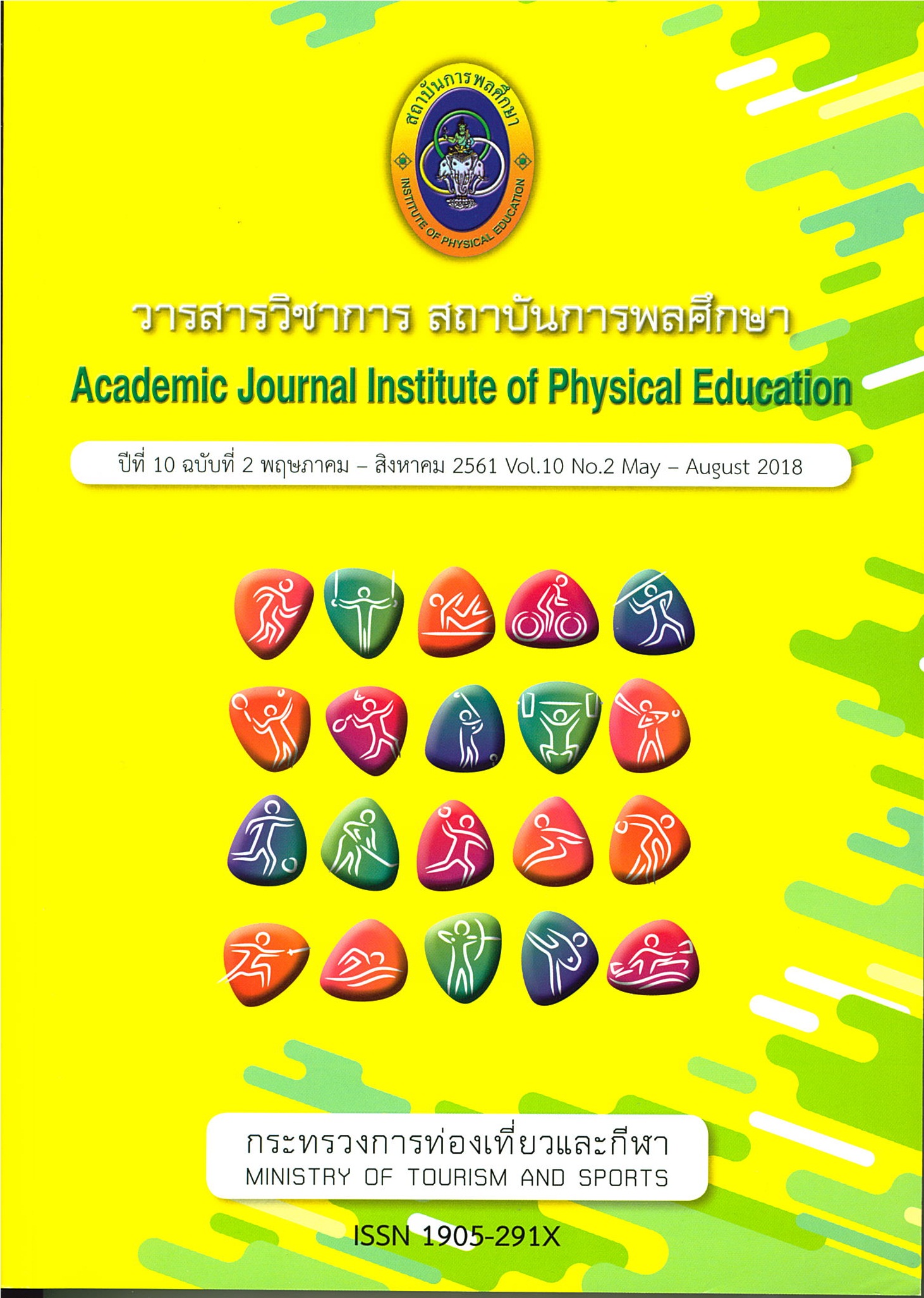The Intrapersonal Causal Factors of Alcohol Consumption Behavior of Undergraduate Students
Main Article Content
Abstract
Drinking problem among undergraduate students is a continuous problem. Even if there are various agencies related to undergraduate students drinking problem have looked for solutions for the issue. However, recent studies showed that the problem could not be solved entirely. This may be due to there are multi-factors that cause undergraduate students drinking problem. This article is a literature review focuses on intrapersonal causal factors. Important therefore external factors change all the time because societies are dynamic. Therefore, if the causal factors alcohol consumption behavior of undergraduate students is found, it will lead to the design of sustainable behavior change in the future. The article has found that the health literacy, alcohol expectancy, drinking refusal self-efficacy affect the alcohol consumption behavior. Therefore, to tackle and reduce the effect of alcohol consumption, priority must be given to developing programs to modify the alcohol consumption behavior by there being in-depth researches to determine the proper way to effectively change alcohol consumption behavior for wide benefit further
Article Details
The published article is a copyright of the Academic Journal of Thailand National Sports University. The passage appeared in each article in this academic journal is a perspective of each author which is not related to the journal. Each author is required to be responsible for all components of his/her own article. If there are any mistakes, each author must be responsible for those mistakes on his/her own.
References
กรมควบคุมโรคกระทรวงสาธารณสุข. (2554).กรอบแผนยุทธศาสตร์ 5 ปี การดำเนินงานควบคุมเครื่องดื่มแอลกอฮอล์ (ปี 2557-2561). นนทบุรี:กรมควบคุมโรคกระทรวงสาธารณสุข. (เอกสารอัดสำเนา).
ชลธิชา อรุณพงษ์. (2552). พฤติกรรมการป้องกันการดื่มเครื่องดื่มแอลกอฮอล์ของนักเรียนชั้นมัธยมศึกษาตอนปลายในจังหวัดอุบลราชธานี. วารสารพิชญทรรศน์. 4(2), 113-121.
รัตติยา บัวสอน และเชษฐรัชดา พรรณาธิกุล. (2554). พฤติกรรมการบริโภคเครื่องดื่มแอลกอฮอล์ของนักศึกษามหาวิทยาลัยระดับปริญญาตรีในเขตกรุงเทพมหานคร. รามาธิบดีพยาบาลสาร. 18(2), 259-271.
วิชุดา กิจธรธรรม. (2554). เหตุและผลของพฤติกรรมการดื่มแอลกอฮอล์ของนิสิต/นักศึกษาไทย. วารสารพฤติกรรมศาสตร์. 18(1), 1-16.
ศูนย์วิจัยปัญหาสุรา. (2556). สถานการณ์การบริโภคเครื่องดื่มแอลกอฮอล์และผลกระทบในประเทศไทยปี 2556. นนทบุรี: บริษัท เดอะกราฟิโก ซิสเต็มส์ จำกัด.
สมพร สิทธิสงคราม ดาราวรรณ ต๊ะปินตา และสมบัติสกุลพรรณ์. (2551). ปัจจัยทำนายพฤติกรรมการดื่มเครื่องดื่มแอลกอฮอล์ของวัยรุ่น. พยาบาลสาร. 35 (3), 130-141.
Bandura, A. (1986). Social Foundation of Thought and Action. NJ : Prentice-Hall.
Chang, F., Miao, N., Lee, C., Chen, P., Chiu, C., & Lee, S. (2016).The association of media exposure and media literacy with adolescent alcohol and tobacco use. Journal Health Psychology. 21(4), 513-525.
Dawn, W.F., Nelson, Y. & Clayton, N. (2014). I think I can’t: Drink refusal self-efficacy as a mediator of the relationship between self-reported drinking identity and alcohol use. Addictive Behaviors. 39(2014), 461-468.
Deena J. C., Jennifer A. M. ,Kelly J. K., Michael P. & Marshal D. (2014). Health literacy, alcohol expectancies, and alcohol use behaviors in teens. Patient Education and Counseling. 97(2): 291–296.
Donna M. G., Cynthia L. T, & David M. F. (2006). Social anxiety, alcohol expectancies, and self-efficacy as predictors of heavy drinking in college students. Addictive Behaviors. 31(3), 388-398.
Dunn, M. E., Lau, C. H., & Cruz, I. Y (2000). Changes in activation of alcohol expectancies in memory in relation to changes in alcohol use after participation in an expectancy challenge program. Experimental and Clinical Psychopharmacology. 8, 566-575.
Goldsmith A. A., Tran G. Q., SmithJ. P. & HoweS .R. (2009). Alcohol Expectancies and drinking motives in college drinkers : Mediating effects on the relationship between generalized
anxiety and heavy drinking in negative-affect situations. Addictive Behaviors. 34(6-7), 505-513.
Ham, L. S., & Hope, D. A. (2003). College students and problematic drinking: A review of the literature. Clinical Psychology Review. 23(5), 719–759.
Hasking, P., Shortell, C., & Machalek, M. (2005). University students’ knowledge of alcoholic drink and their perception of alcohol related harm. Journal of Drug Education. 35(2005), 95-109.
Hawkins, J. D., R. F. Catalano, & J.Y. Miller. (1992). Risk and protective factors for alcohol and other drug problems in adolescence and early adulthood: Implications for substance abuse prevention. Psychological Bulletin. 112(1), 64-105.
Karam, E., Kypri, K. & Salamoun, M. (2007). Alcohol use among college students: An international perspective. Current Opinion in Psychiatry. 20(3), 213–221.
Kong, G. & Bergman, A. (2010). A motivational model of alcohol misuse in emerging adulthood. Addictive behaviors. 35(10), 855-860.
Nutbeam, D. (2008).The evolving concept of health literacy. Social Science and Medicine. 67(12), 2072-2078.
Oei, T. P., & Jardim, C. L. (2007). Alcohol expectancies, drinking refusal self-efficacy and drinking behaviour in Asian and Australian students. Drug and Alcohol Dependence. 87, 281-287
O’Malley, P. M., & Johnston, L. D. (2002).Epidemiology of alcohol and other drug use among American college students. Journal of Studies on Alcohol. S14, 23–39.
Petraitis, J., Flay, B. R., & Miller, T. Q. (1995). Reviewing theories of adolescent substance use: Organizing pieces in the puzzle. Psychological Bulletin. 117, 67-86.
Rundel-Thiele, S., Siemieniako, D., Kubacki, K., & Deshapnde, S. (2013). Benchmarking alcohol literacy: A multi country study. Model Management Review. 20(1), 99-111.
WHO. (2014). Global status report on alcohol and Health 2014. Geneva: World Health Organization.
Young. R. M. & Oei, T. (1996). Drinking expectancy profile: Test manual. Australia: Behavior Research and Therapy Centre.
Zamboanga. B.L. (2005). Alcohol expectancies and drinking behaviors in Maxican American college students. Addictive Behaviors. 30(4), 673-684.


